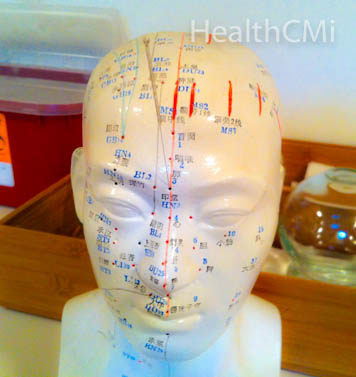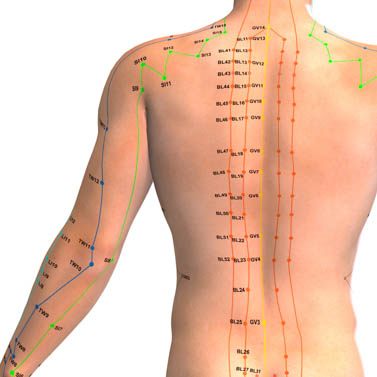Acupuncture effectively relieves inflammation and swelling of the nose for patients with allergic rhinitis. The condition involves inflammation of the nasal membranes leading to various symptoms: stuffy nose, runny nose, itching, postnasal drip, headache, fatigue, red eyes, sneezing.  Research published in the International Journal of Traditional Chinese Medicine investigated traditional acupuncture and a new procedure based on acupuncture techniques. Both approaches to patient care were effective in relieving chronic allergic rhinitis.
Research published in the International Journal of Traditional Chinese Medicine investigated traditional acupuncture and a new procedure based on acupuncture techniques. Both approaches to patient care were effective in relieving chronic allergic rhinitis.
The traditional acupuncture group received treatment with 0.30 mm X 40 mm acupuncture needles. The primary acupuncture points employed in the investigation were:
The new procedure was applied to a separate study group other than that of the traditional acupuncture group. The procedure involved acupuncture needle stimulation of the sphenopalatine ganglion. The technique was innovated by Prof. Li Xinwu, former Beijing Tongren Hospital director of Otolaryngology Head and Neck Surgery. The research documents that approximately 130,000 patients have undergone this procedure for the treatment of allergic rhinitis. This procedure requires special training on the part of the practitioner.
Stimulation of the sphenopalatine ganglion using an acupuncture needle is applied with the patient in a seated position. A 0.35 mm X 60 mm acupuncture needle is applied to a point located at the seam between the lower edge of the zygomatic arch and the mandibular coronoid to a depth of the sphenopalatine ganglion. The needle penetrates the masticatory muscle group, the masseter and temporalis muscles, and enters from the pterygomaxillary split. The treatment was applied 1 - 2 times per week for 4 consecutive weeks.
The research was conducted at the Xiyuan Hospital of China Academy of Traditional Acupuncture with a sample size of 50 patients. Before and after treatment, an assessment of subjective and objectives indices were evaluated. A Rhinoconjunctivitis Quality of Life Questionnaire (RQLQ) was used. A rhinoscope was used to evaluate swelling. Clinical evaluation of signs and symptoms were recorded, including a 1 month follow-up after completion of treatments.
The traditional acupuncture and sphenopalatine ganglion stimulation groups demonstrated significant improvements marked by both objective and subjective positive patient outcomes. Statistically, the sphenopalatine ganglion stimulation group outperformed the traditional acupuncture group. From a clinical perspective, this new technique is best suited for the hospital setting due to its aggressive nature. Traditional acupuncture demonstrates significant positive patient outcomes and is well suited to a multiplicity of clinical settings due to its gentle nature.
References:
Bousquet J,Khaltaev N,Cruz A A,et al. Allergic Rhinitis and its Impact on Asthma (ARIA) 2008 update (in collaboration with the World Health Organization,GA(2)LEN and AllerGen)[J]. Allergy,2008,63(S86):S8-S160.
Sphenopalatine ganglion stimulation with acupuncture for perennial allergic rhinitis: A non-randomized traditional Chinese acupuncture (verum acupuncture) controlled pilot trial. (2015). International Journal of Traditional Chinese Medicine, 37(5), 396-400.
 Research published in the International Journal of Traditional Chinese Medicine investigated traditional acupuncture and a new procedure based on acupuncture techniques. Both approaches to patient care were effective in relieving chronic allergic rhinitis.
Research published in the International Journal of Traditional Chinese Medicine investigated traditional acupuncture and a new procedure based on acupuncture techniques. Both approaches to patient care were effective in relieving chronic allergic rhinitis.The traditional acupuncture group received treatment with 0.30 mm X 40 mm acupuncture needles. The primary acupuncture points employed in the investigation were:
- Yintang (extra point)
- Fengchi (GB20)
- Fengfu (DU16)
- Zusanli (ST36)
- Shangxing (DU23)
- Hegu (LI4)
- Feishu (BL13)
- Pishu (BL20)
- Shenshu (BL23)
- Sanyinjiao (SP6)
The new procedure was applied to a separate study group other than that of the traditional acupuncture group. The procedure involved acupuncture needle stimulation of the sphenopalatine ganglion. The technique was innovated by Prof. Li Xinwu, former Beijing Tongren Hospital director of Otolaryngology Head and Neck Surgery. The research documents that approximately 130,000 patients have undergone this procedure for the treatment of allergic rhinitis. This procedure requires special training on the part of the practitioner.
Stimulation of the sphenopalatine ganglion using an acupuncture needle is applied with the patient in a seated position. A 0.35 mm X 60 mm acupuncture needle is applied to a point located at the seam between the lower edge of the zygomatic arch and the mandibular coronoid to a depth of the sphenopalatine ganglion. The needle penetrates the masticatory muscle group, the masseter and temporalis muscles, and enters from the pterygomaxillary split. The treatment was applied 1 - 2 times per week for 4 consecutive weeks.

The research was conducted at the Xiyuan Hospital of China Academy of Traditional Acupuncture with a sample size of 50 patients. Before and after treatment, an assessment of subjective and objectives indices were evaluated. A Rhinoconjunctivitis Quality of Life Questionnaire (RQLQ) was used. A rhinoscope was used to evaluate swelling. Clinical evaluation of signs and symptoms were recorded, including a 1 month follow-up after completion of treatments.
The traditional acupuncture and sphenopalatine ganglion stimulation groups demonstrated significant improvements marked by both objective and subjective positive patient outcomes. Statistically, the sphenopalatine ganglion stimulation group outperformed the traditional acupuncture group. From a clinical perspective, this new technique is best suited for the hospital setting due to its aggressive nature. Traditional acupuncture demonstrates significant positive patient outcomes and is well suited to a multiplicity of clinical settings due to its gentle nature.
References:
Bousquet J,Khaltaev N,Cruz A A,et al. Allergic Rhinitis and its Impact on Asthma (ARIA) 2008 update (in collaboration with the World Health Organization,GA(2)LEN and AllerGen)[J]. Allergy,2008,63(S86):S8-S160.
Sphenopalatine ganglion stimulation with acupuncture for perennial allergic rhinitis: A non-randomized traditional Chinese acupuncture (verum acupuncture) controlled pilot trial. (2015). International Journal of Traditional Chinese Medicine, 37(5), 396-400.

I want to share with you all on how Dr Itua saves my life with his powerful Herbal medicines, I was diagnosed of Oral/Ovarian Cancer which i suffered from for 5 years with no positive treatment until when My son came to me in the hospital when i was laying down on my dying bed waiting for god to call out my name to join him in heaven.
ReplyDeleteMy son was so excited that very day he came across Dr Itua on Blogspot, we decided to give him a try although we Americans are so scared to trust Africans but i really have no choice that time to choose life in between so we gave a try to Dr Itua Herbal medicines, god willing he was a good man with a god gift. Dr Itua sent us the herbal medicine. It was three bottles. I take it for a three weeks instructor and these herbal medicines heal me, cure my Oral/Ovarian Cancer completely. I have been living for 9 months now with a healthy life with no more symptoms.
I'm sponsoring Dr Itua in LA Advert on Cancer patent seminar which my son will be participating too and other patent Dr Itua has cured from all kind of human disease, also if you are sick from disease like,Epilepsy,Breast Cancer,Prostate Cancer,Throat cancer,Thyroid Cancer,Uterine cancer,Fibroid,Angiopathy, Ataxia,Arthritis,Brain cancer,Hiv,. Vaginal cancer,Herpes,Colon-Rectal Cancer,Chronic Disease.Amyotrophic Lateral Sclerosis,Brain Tumor,Fibromyalgia,Fluoroquinolone Toxicity,Multiple myeloma,Tach Diseases,Leukemia,Liver cancer,
Esophageal cancer,Gallbladder cancer,,Bladder cancer,Gestational trophoblastic disease,Head and neck cancer,Hodgkin lymphoma
Intestinal cancer,Kidney cancer,Hpv,Lung cancer,Adrenal cancer.Bile duct cancer,Bone cancer,Melanoma,Mesothelioma,Neuroendocrine tumors
Non-Hodgkin lymphoma,Cervical Cancer,Oral cancer,Hepatitis,Skin cancer,Soft tissue sarcoma,Spinal cancer,Pancreatic Cancer, Stomach cancer
Testicular cancer,
Syndrome Fibrodysplasia Ossificans ProgresS sclerosis,Alzheimer's disease,Chronic Diarrhea,Copd,Parkinson,Als,Adrenocortical carcinoma Infectious mononucleosis,Vulvar cancer,Ovarian cancer,,Sinus cancer, Here Is The Wonderful Healer Contact. Name_ Doctor Itua, Email Contact: drituaherbalcenter@gmail.com, Phone/WhatsApp: +2348149277967